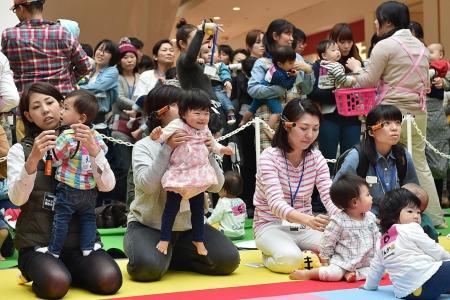S'pore has one of the lowest mortality rates for newborns: UN report
Education, access to healthcare crucial in reducing infant mortality rate: Unicef
WASHINGTON Singapore has one of the lowest mortality rates for newborns in the world, said a Unicef report released yesterday.
Japan leads the list with one in 1,111 at risk of dying, followed by Iceland (a one in 1,000 chance of death), Singapore (one in 909), Finland (one in 833), Estonia and Slovenia (both one in 769), Cyprus (one in 714) and Belarus, Luxembourg, Norway and South Korea (all with risks of one in 667).
These countries are mostly well-off countries with strong education and health care systems, the report said.
Education matters. Babies born to mothers with no education face nearly twice the risk of early death as babies whose mothers have at least a secondary education.
The United States - generally affluent, but with considerable income inequality and wide variations in access to health care - was only the 41st safest country for newborns.
Babies born in the world's poorest countries, most of them in Africa, still face "alarming" risks of death that can be 50 times as high as those in the richest countries, according to the report .
While the last quarter-century has seen broad improvements in older children's health, "we have not made similar progress in ending deaths among children less than one month old," said Ms Henrietta Fore, Unicef's executive director. "Given that the majority of these deaths are preventable, clearly we are failing the world's poorest babies."
The differences are stark.
A baby born in Pakistan - the country with the worst newborn mortality rate - faced a one in 22 chance of death, the report said.
Of the 10 highest-risk countries, eight are in sub-Saharan Africa, countries where "pregnant women are much less likely to receive assistance," due to poverty, conflict or weak institutions, according to the report.
Those eight countries are the Central African Republic (a one in 24 chance of death); Somalia, Lesotho, Guinea-Bissau and South Sudan (all with a one in 26 chance); Cote d'Ivoire (one in 27) and Mali and Chad (both with a one in 28 chance). Each year, some 2.6 million babies do not survive through their first month.
The report was released in conjunction with the launch of a global campaign called Every Child Alive, aimed at ensuring "affordable, quality health care solutions for every mother and newborn."
More than 80 per cent of newborn deaths can be prevented, the report says, "with access to well-trained midwives, along with proven solutions like clean water, disinfectants, breastfeeding within the first hour, skin-to-skin contact and good nutrition".
But shortages of trained health workers and midwives are a major problem in poorer nations.
While a rich country like Norway has 18 doctors, nurses and midwives for every 10,000 people, impoverished Somalia has only one.
Every year, one million babies die the day they are born. - AFP
Get The New Paper on your phone with the free TNP app. Download from the Apple App Store or Google Play Store now



